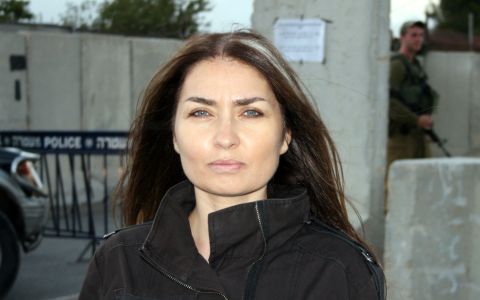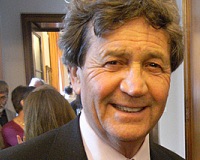Open Bethlehem film shows a little town fighting for survival
by - 26th September 2014

THE BIRTHPLACE of Christ is key to securing a future for Palestinians from across faiths, a film-maker has said.
Leila Sansour’s comments came as the UK parliament prepares to debate whether Palestine should be recognised as a state.
A debate entitled ‘The future of the two-state solution in Israel and Palestine’ on the substantive motion ‘That this House calls on the government to recognise the state of Palestine alongside the state of Israel’ will take place in the Commons on 13 October and is expected to last six hours.
Sansour was speaking at a screening of her film Open Bethlehem at the Royal Geographic Society in London last night, attended by a number of high-profile supporters including writer and broadcaster Melvyn Bragg and journalist Yasmin Alibhai-Brown.
Standoff
Tourism, which makes up the vast majority of Bethlehem’s economy, has been dwindling since the second intifada, which included a 39-day standoff in the famous Church of the Nativity between soldiers and militants.
Now, although it remains a tourism hub, visitors from across the world are bussed in to Bethlehem only to visit the church, glimpse the place in which Jesus is believed to have been born, before leaving again having spent just an hour or two in the ancient city.
‘We would like to see a different kind of tourism,’ Sansour – whose father was the founder of Bethlehem University - said last night. ‘Tourists don’t get the chance to mingle and find out what’s going on here. We ought to educate people about what’s happening in Palestine.’
Sansour also spoke about the need to protect the diverse communities that live in Bethlehem – many of whom have suffered since the eight-foot separation wall was erected.

‘We’re happy to live in a diverse society and in fact we take pride in it,’ she said. ‘Society is much better when you have a variety of people. Bethlehem is a doorway to show the strength of the Palestinian people. But for Bethlehem to survive, Palestinians have to get their rights. Until the wall comes down, Bethlehem has very little hope for its future.’
The Christian exodus from Bethlehem has increased in recent years from the city that was 90 per cent Christian 100 years ago. Now, the city is two-thirds Muslim.
This exodus is echoed across the Middle East, with some 60 per cent of Christians born in Palestine now living in other countries.
Sansour’s gripping feature film was created from 700 hours of footage from what was initially intended to be a year in the life of Bethlehem, but ended up being filmed over a decade.
‘For most, Bethlehem is a myth,’ says Sansour. ‘For me, it is home and a real place right in the heart of the Middle East; a little town currently fighting for survival. Every day more of Bethlehem is being lost. This is all people talk about in town. All of us want to see Bethlehem open again.’
 Speaking about the film Melvyn Bragg said: ‘This film explores the personal and broader story of a Holy city and the struggle to ensure its survival, capturing the experience of life in Bethlehem today.’
Speaking about the film Melvyn Bragg said: ‘This film explores the personal and broader story of a Holy city and the struggle to ensure its survival, capturing the experience of life in Bethlehem today.’
Broadcaster Jon Snow describes the film as: ‘One of the most remarkable and moving documentaries I have seen, about this unreported story. The tragedy of the Palestinians encapsulated in the life of one family and one town – Bethlehem. See the film, then go to Bethlehem and see for yourself.’
Open Bethlehem is not just a film, but also an international campaign, which is working to promote global engagement with Bethlehem and build up a network of ambassadors who will advocate on its behalf.
The vision of the campaign is to support a lasting peace settlement between Palestine and Israel using Bethlehem as a doorway.
One of the unique parts of the campaign is the creation of a Bethlehem Passport in partnership with the Bethlehem Governate – a symbolic citizenship of the ancient city.
The Open Bethlehem film will open in the UK during Christmas 2014.
